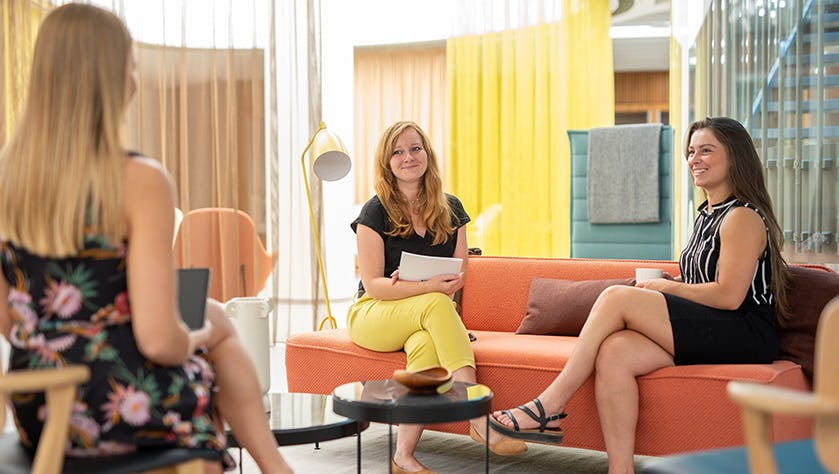
For most office workers, autonomy over where they work is more important than extra cash, post-pandemic
While workers and business owners might feel anxious about what’s next for the economy in the wake of Covid-19, new research from IWG shows that the pandemic has had such an effect on employees’ priorities that most would forgo a 10% pay rise in order to keep working remotely.
According to the survey, 72% of office workers would prefer a hybrid way of working to a full-time return to the office – even if reverting to the old Monday to Friday routine meant earning 10% more money.
Research from the Office for National Statistics underlines this shift in attitudes. It found that 85% of adults who worked from home during periods of lockdown were keen to split their time between working remotely and at the company HQ, going forward.
“The real catalyst”
IWG’s founder and CEO Mark Dixon points to the pivotal role of technology in enabling the shift. “The real catalyst,” he explains, “is the digital revolution, which started in the 1970s with the launch of the first personal computers. Now, technology puts into workers’ hands all the tools they need to do their job.”
It’s no coincidence that younger workers and digital natives are especially comfortable with hybrid working. IWG’s research showed that 84% of 18-24-year-olds would prefer flexible working practices over adding 10% to their salary, indicating the high value they place on having ownership of their work schedules and commuting habits.
Happier, more loyal staff
Of the workers IWG surveyed, two thirds of those aged 25-34 would not consider applying for a job if hybrid working wasn’t possible. Meanwhile, 83% of workers would now be more likely to apply for a position if it offered a flexible way of working.
In the new world of work, firms looking to hire the brightest and best talent will need to offer a working model that’s built on trust, individual responsibility and outcomes – not one that’s based on presenteeism.
According to Acas, employers who embrace hybrid working will find it easier to hang on to their best people. Reducing the need for employees to commute empowers them to achieve improved work-life balance, reclaiming ‘wasted’ time that can be spent with family and friends or on vital self-care.
And while many companies were reluctant to allow remote working before the pandemic, research indicates that their fears were unfounded: having a distributed workforce does not negatively affect how much work people do. CIPD has found that remote working either had no significant effect or actually helped to improve productivity during the Covid-19 crisis.
Not the end for the office
Even in a hybrid world, the corporate HQ still has an important part to play. Regular visits will allow for collaboration and connecting, and forward-looking businesses are already examining how office space can be reconfigured as well as scaled back. Around the world, old-fashioned rows of desks will be replaced by areas dedicated to creativity, active work and discussion.
In IWG’s survey, 84% of 18-24-year-olds felt that collaboration was easier in an office environment, while 82% believed that having the opportunity to spend time with colleagues face to face would help them develop the core skills they need for career advancement.
Meanwhile, 90% agreed that working from an office was helpful for maintaining work-life boundaries, with leaving the building a clear stopping point at the end of the day.
The vital ‘third location’
The same can be said of working from a local flexible workspace, with the physical departure for home a useful line in the sand for those who might otherwise allow the working day to stretch on.
Giving employees the option to work from such locations is a key way for employers to ensure the long-term success of the hybrid model. Having a ‘third location’ – neither the home nor the corporate HQ – to work from combines the best of both worlds, removing people from domestic distractions but also freeing them from the rat race.
Enterprises including Standard Chartered bank and Cisco have signed deals with IWG that will give staff access to its global network of flexible workspaces. Such partnerships help firms to cut real estate costs at the same time as ensuring staff are able to work from professional, well-equipped environments near home.
Flexible and coworking spaces also offer advantages in terms of their potential for hosting meetings and encouraging networking. NTT, which inked a groundbreaking deal with IWG earlier this year, is even developing an app to help employees find one another at flexspace locations.
Better for people, profit and the planet
While it has clear benefits for people and profitability, it’s important to note that the hybrid approach can also reduce businesses’ impact on the environment. “Companies of all sizes see addressing the need for their people to commute as the single greatest contribution they can make to cutting their carbon footprint,” says Dixon.
Overall, he argues, the advantages of the hybrid model are now too clear to ignore. “Over the last 18 months, we’ve seen businesses recognise the benefits hybrid working has on their bottom line, but this latest research demonstrates the importance of hybrid working to the lifestyles and happiness of employees across the country,” he says.
“The fact many are more concerned about a flexible work policy than a pay rise speaks volumes as to the permanent behaviour and mind-set shift caused by the pandemic.”
Enjoy this? You might also like these Spaces magazine stories:
Share this article
 Read now How to boost creativity, wherever you’re working
Read now How to boost creativity, wherever you’re working
 Read now How to reconnect with your colleagues
Read now How to reconnect with your colleagues